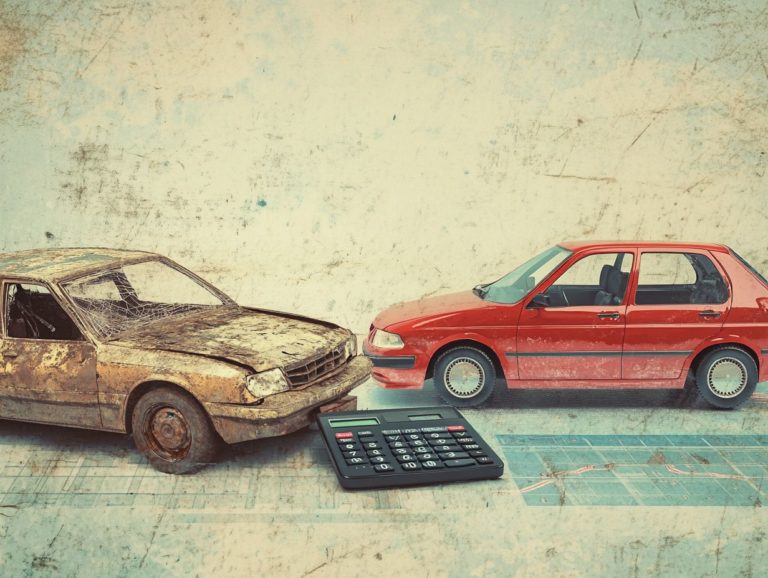Comparing Policies: What is Collision Coverage?
Collision coverage is a key part of auto insurance. It protects you financially if an accident occurs.
Every car owner should understand what it means. This article explains how collision coverage differs from comprehensive and liability coverage, and when you might need it based on your situation.
We ll help you choose the right coverage limits and show you how to save money. This way, you can make smart choices about your auto insurance policy.
Contents
Key Takeaways:
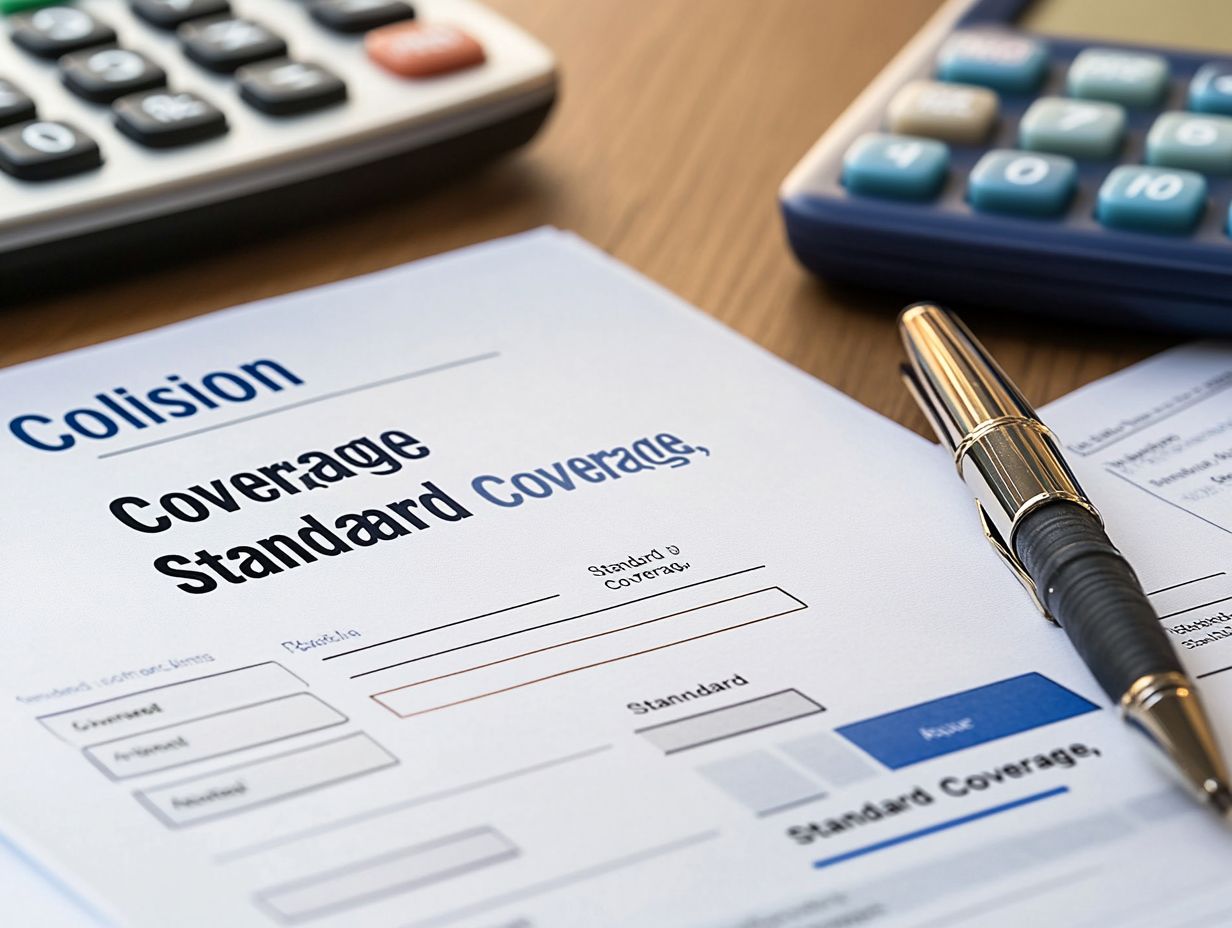
- Collision coverage helps pay for damage to your vehicle after an accident.
- It s different from comprehensive and liability coverage, which serve other purposes.
- When considering collision coverage, think about your vehicle’s value and driving history. Choosing the right limits can save you money.
Understanding Collision Coverage
Understanding collision coverage is important for car owners who want to avoid expensive repairs. This insurance covers damages to your vehicle from accidents, making repairs much more manageable.
This type of auto insurance is vital for unexpected damage to your car, especially if you have a loan. Knowing how collision coverage works helps you choose the right insurance for your needs.
How Collision Coverage Differs from Other Types of Auto Insurance
Collision coverage is unique compared to comprehensive insurance and liability coverage. While it covers vehicle damage from accidents, comprehensive insurance protects against risks like theft and natural disasters.
Liability coverage deals with costs related to damage or injury caused to others during an accident. Knowing these differences helps you navigate insurance options effectively.
Comprehensive Coverage
Comprehensive coverage protects you from various threats, like theft and natural disasters. It’s especially useful in non-collision situations.
For example, if a hailstorm damages your car or a tree falls on it, comprehensive insurance covers repair costs. If your car is stolen, this insurance makes replacing it much easier.
This coverage protects against a wide range of incidents, allowing you to drive confidently.
Liability Coverage
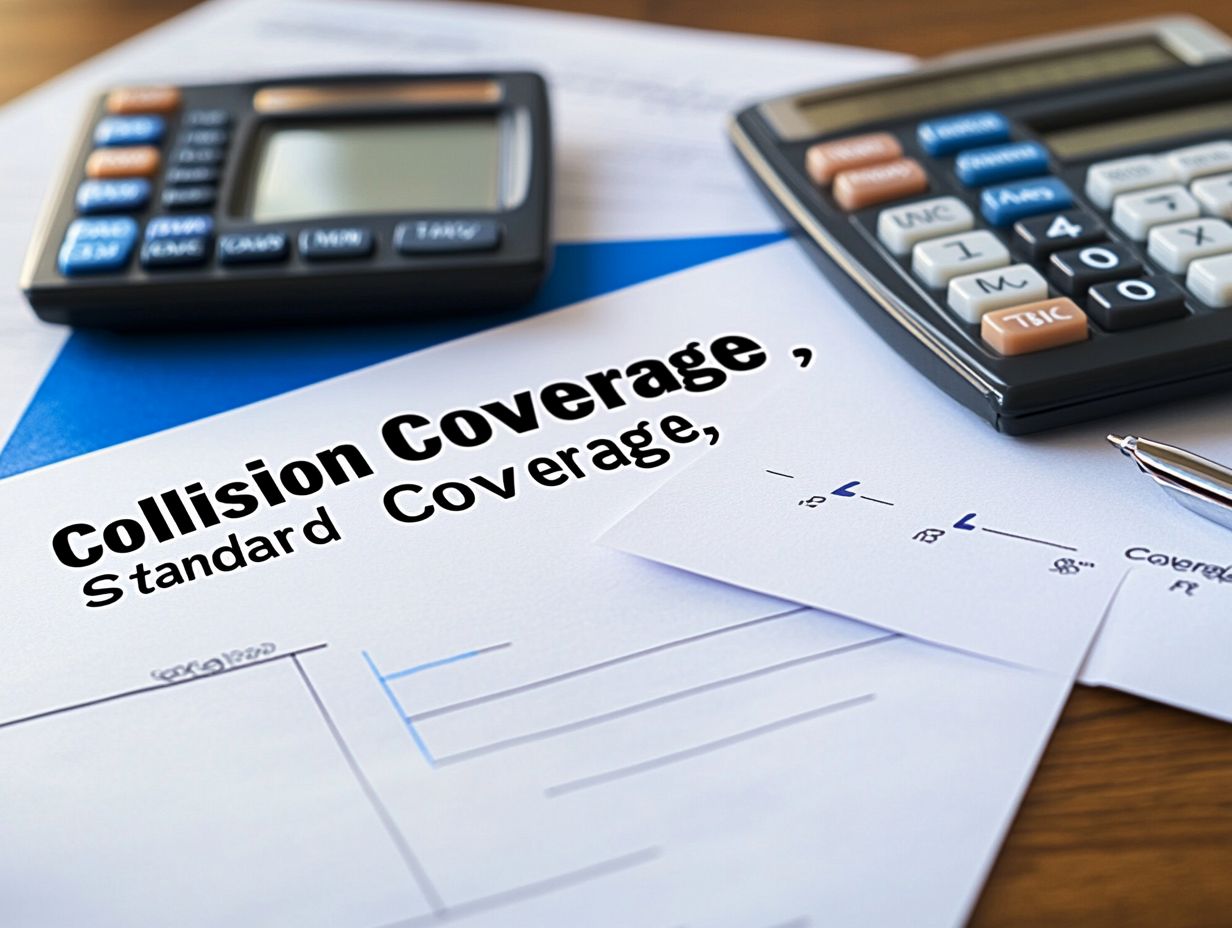
Liability coverage is a key part of your auto insurance. It protects you from costs related to property damage and personal injury in traffic accidents.
Think of it as your safety net. If an accident happens, you re prepared for expenses from legal claims or damages. Unlike collision and comprehensive coverage, liability coverage focuses on your financial responsibilities to others.
With this protection, you can drive with greater peace of mind, ready to handle unexpected financial burdens.
When is Collision Coverage Necessary?
Collision coverage is essential for vehicle owners like you who want to safeguard their finances in the event of an accident or collision. When evaluating your insurance needs and claims history, understanding how to choose between comprehensive and collision coverage becomes even more critical.
If you have a recent claims record or own a newer vehicle, the potential repair costs from collision damage can rise dramatically. This makes this coverage essential.
It’s also vital to grasp the implications of your deductible amounts. These amounts directly influence your out-of-pocket expenses before your insurance steps in to help.
Factors to Consider
When you re contemplating collision coverage, there are several key factors to weigh. Consider insurance premiums, deductible choices, and the level of financial protection that feels right for you.
Your individual driving habits are particularly important. If you often navigate busy urban areas, you might want to consider more comprehensive coverage to shield against higher-risk scenarios.
Likewise, the value of your vehicle plays a significant role. Newer or luxury cars typically require more robust coverage due to their repair costs.
Think about your budget. It will guide your choices. If you’re working with a tighter budget, you might lean toward a higher deductible to lower your premium. On the other hand, if minimizing out-of-pocket expenses in the event of a claim is your priority, a lower deductible might be more appealing.
Ultimately, striking a balance among these elements will help you select the most suitable plan to protect your investment.
How to Choose the Right Collision Coverage
Selecting the right collision coverage necessitates a thoughtful evaluation of coverage limits, deductible options, and the array of insurance discounts offered by various companies.
This meticulous approach will help you secure optimal protection tailored to your needs.
Factors to Consider When Selecting Coverage Limits
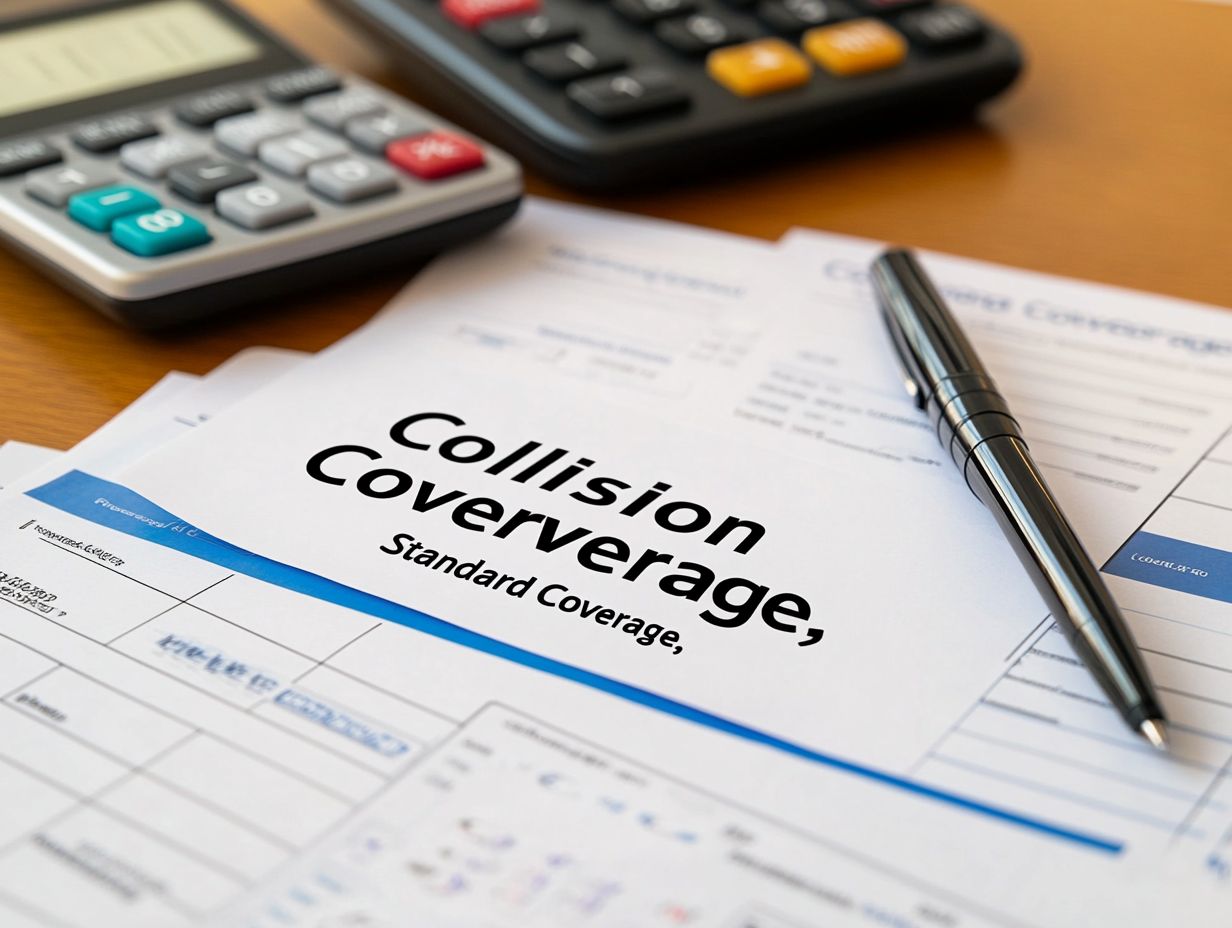
When determining your collision insurance coverage limits, it’s essential to weigh the potential vehicle damage against your car s market value. Also, consider the deductibles that suit your financial preferences.
The ideal coverage should reflect not only the current market value of your vehicle but also the anticipated repair costs that may arise from an accident. As you explore your options, take a moment to reflect on your financial situation. Think about how much you can comfortably manage for a deductible if you need to file a claim.
While a lower premium might seem appealing, it often comes hand-in-hand with higher deductibles. You could face significant out-of-pocket expenses when the time comes.
On the other hand, opting for higher coverage limits can provide you with a greater sense of security. This can alleviate potential financial stress during unforeseen incidents. Striking the right balance among these factors will ultimately lead you to a thoughtful insurance strategy that safeguards both your vehicle and your financial stability.
Costs and Savings Associated with Collision Coverage
Grasping the costs and savings tied to collision coverage is crucial for car owners. This knowledge not only influences insurance premiums but also opens the door to potential savings through various insurance discounts.
Potential Savings and Discounts
As a car owner, you have the opportunity to unlock various potential savings and discounts on your collision coverage. You could save big with lower premium rates based on your driving record and the amount of your deductible.
You might also find opportunities like multi-policy discounts, which reward you for bundling your auto insurance with other policies such as home or renters insurance.
Insurance companies often offer safe driver discounts for those who maintain a clean driving record, showcasing responsible behavior on the road. Plus, if you ve been a loyal customer, you can enjoy loyalty rewards that recognize your commitment over the years.
By taking the time to explore and understand these discount options, you can significantly reduce your overall insurance costs. This can make a notable difference in your budget.
Watch this video to learn more about collision coverage!
Frequently Asked Questions
What is collision coverage?
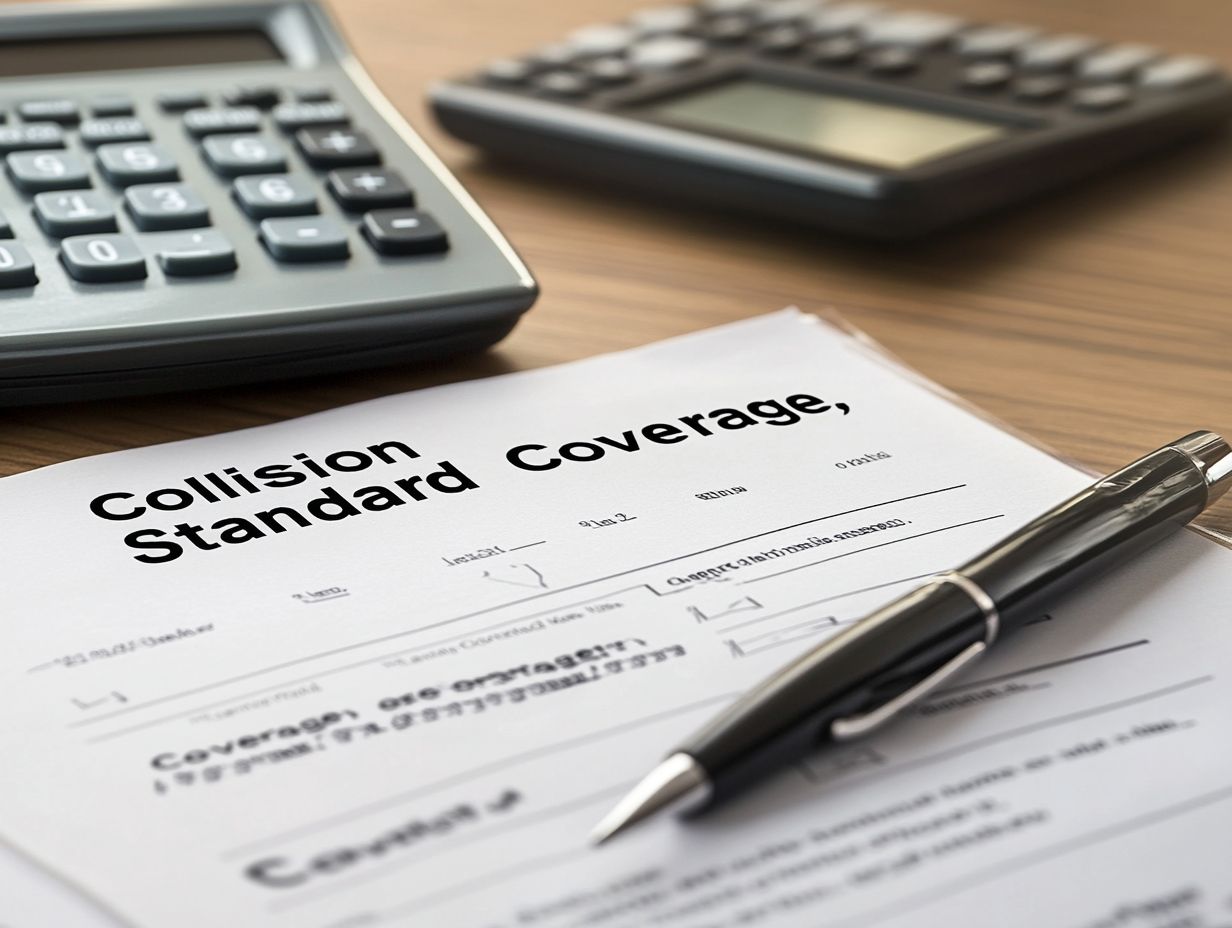
Collision coverage is a type of auto insurance that covers damage to your vehicle in a collision with another vehicle or a stationary object. For a deeper understanding of different policies, including underinsured motorist coverage, it’s beneficial to compare your options.
How is collision coverage different from liability coverage?
Liability coverage pays for damage to others’ property or injuries if you’re at fault. Collision coverage, however, pays for damage to your own vehicle, regardless of fault.
Is collision coverage required by law?
No, collision coverage is not required by law. If you have a car loan or lease, your lender may require you to have collision coverage.
What types of damage are covered by collision coverage?
Collision coverage helps pay for vehicle damage from crashes with other cars, objects, or even rollovers. It may also cover damage from potholes or other road hazards.
Are there any exclusions to collision coverage?
Yes, there are exclusions to collision coverage. Common exclusions include intentional damage to your vehicle, damage from racing or other high-risk activities, and using your vehicle for commercial purposes.
How much does collision coverage cost?
The cost of collision coverage varies based on factors like your vehicle’s value, your driving history, and your location. It is usually more expensive than liability coverage, but don’t risk your investment! Collision coverage gives you crucial protection in case of an accident.






